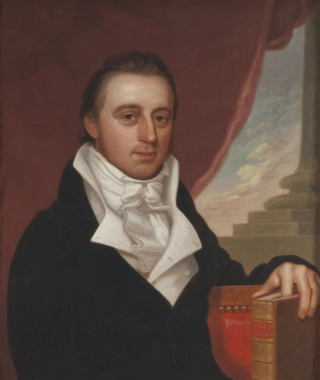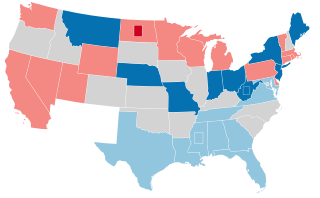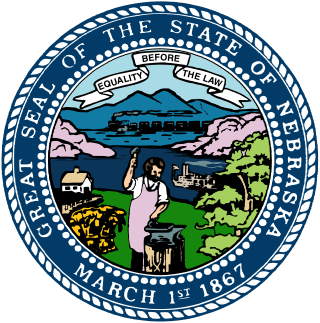This article relies largely or entirely on a single source .(October 2024) |
A special election was held in Delaware's at-large congressional district on October 6, 1807, to fill a vacancy left by the resignation of James M. Broom (F)
This article relies largely or entirely on a single source .(October 2024) |
A special election was held in Delaware's at-large congressional district on October 6, 1807, to fill a vacancy left by the resignation of James M. Broom (F)
In 1806, James M. Broom (F) was re-elected to a second term in Delaware's at-large district . He'd won his first term in a special election caused by James A. Bayard's election to the Senate. However, Broom did not serve this second term, instead resigning as well, before the start of the Tenth Congress. A special election was held for his replacement.
| Candidate | Party | Votes [1] | Percent |
|---|---|---|---|
| Nicholas Van Dyke | Federalist | 3,294 | 51.7% |
| John Dickinson | Democratic-Republican | 3,078 | 48.3% |
| Others | 3 | 0.05% |
Delaware became a U.S. state in 1787, which allowed it to send congressional delegations to the United States Senate and United States House of Representatives beginning with the 1st United States Congress in 1789. Voters in each state elect two senators to serve for six years, and members of the House to two-year terms. Before 1914 United States Senators were chosen by the Delaware General Assembly and before 1935 all congressional terms began March 4.

The 1978 United States Senate elections were held on November 7, in the middle of Democratic President Jimmy Carter's term. The 33 seats of Class 2 were contested in regular elections. Special elections were also held to fill vacancies.

The 1972 United States Senate elections were held on November 7, with the 33 seats of Class 2 contested in regular elections. They coincided with the landslide re-election of Republican President Richard Nixon. Despite Nixon's landslide victory, Democrats increased their majority by two seats. The Democrats picked up open seats in Kentucky and South Dakota, and defeated four incumbent senators: Gordon Allott of Colorado, J. Caleb Boggs of Delaware, Jack Miller of Iowa, and Margaret Chase Smith of Maine. The Republicans picked up open seats in New Mexico, North Carolina, and Oklahoma, and defeated one incumbent, William B. Spong Jr. of Virginia.

Nicholas Van Dyke was an American lawyer and politician from New Castle, Delaware. He was a member of the Federalist Party, who served in the Delaware General Assembly, as Attorney General of Delaware, as U.S. Representative from Delaware, and as U.S. senator from Delaware.

The 1812–13 United States House of Representatives elections were held on various dates in various states between August 3, 1812, and April 30, 1813. Each state set its own date for its elections to the House of Representatives before the first session of the 13th United States Congress convened on May 24, 1813. They coincided with James Madison being re-elected president.

James Madison Broom was an American lawyer and politician from Wilmington, in New Castle County, Delaware. He was a member of the Federalist Party, who served as a U. S. Representative from Delaware.

The 1910–11 United States Senate election were held on various dates in various states. As these U.S. Senate elections were prior to the ratification of the Seventeenth Amendment in 1913, senators were primarily chosen by state legislatures. Senators were elected over a wide range of time throughout 1910 and 1911, and a seat may have been filled months late or remained vacant due to legislative deadlock. However, some states had already begun direct elections during this time. Oregon pioneered direct election and experimented with different measures over several years until it succeeded in 1907. Soon after, Nebraska followed suit and laid the foundation for other states to adopt measures reflecting the people's will. By 1912, as many as 29 states elected senators either as nominees of their party's primary or in conjunction with a general election.
The Republican State Committee of Delaware is the affiliate of the United States Republican Party in Delaware. It has five regional offices in Kent County, Western New Castle County, Central New Castle County, Northern New Castle County, and Sussex County.

The 2007 Houston elections took place on May 12, June 16, and November 6, 2007. All City Council posts, the City Controller, and the Mayor all had elections. All positions were non-partisan.

The 1852–53 United States Senate elections were held on various dates in various states, coinciding with the 1852 presidential election. As these U.S. Senate elections were prior to the ratification of the Seventeenth Amendment in 1913, senators were chosen by state legislatures. Senators were elected over a wide range of time throughout 1852 and 1853, and a seat may have been filled months late or remained vacant due to legislative deadlock. In these elections, terms were up for the senators in Class 2.

Elections were held in Delaware on Tuesday, November 2, 2010. Primary elections were held on September 14, 2010.

Elections to the House of Representatives were held in Pennsylvania on October 14, 1794, for the Fourth Congress.

Elections to the United States House of Representatives were held in Pennsylvania on October 13, 1812, for the 13th Congress.

A special election was held in Delaware's at-large congressional district on October 1, 1805, to fill a vacancy resulting from the resignation of James A. Bayard, a Federalist, upon election to the Senate. Bayard had earlier served in the House in the 5th, 6th, and 7th congresses before being narrowly defeated for re-election in 1802 by Caesar A. Rodney, whom he, in turn, defeated in 1804.

The 1806 United States House of Representatives election in Delaware was held on October 7, 1806, to elect the U.S. representative from Delaware's at-large congressional district. Incumbent Federalist James M. Broom faced re-election to a full term after winning the previous year's special election. He was challenged by three Democratic-Republicans.

The 1884 United States elections were held on November 4, electing the members of the 49th United States Congress. The election took place during the Third Party System. The Democratic governor Grover Cleveland of New York defeated Republican secretary of state James G. Blaine in the presidential election. In Congress, the Republicans retained control of the Senate while Democrats maintained control of the House of Representatives. This marks the last election in U.S. history in which the Democratic president came to office without unified control of Congress.

The 1955 Philadelphia municipal election, held on Tuesday, November 8, involved contests for mayor, district attorney, all seventeen city council seats, among other offices. Citywide, the Democrats took majorities of over 130,000 votes, continuing their success from the elections four years earlier. Richardson Dilworth, who had been elected district attorney in 1951, was elected mayor. Victor H. Blanc, a city councilman, was elected district attorney. The Democrats also kept fourteen of seventeen city council seats, losing one district seat while gaining another, and kept control of the other citywide offices. The election represented a further consolidation of control by the Democrats after their citywide victories of four years earlier.

A general election was held in the U.S. state of Delaware on November 6, 2018. Half of Delaware's executive officers were up for election as well as a United States Senate seat and Delaware's at-large seat in the United States House of Representatives. Primary elections were held on September 6, 2018.

The 1922 United States Senate election in Delaware took place on November 7, 1922. This election pitted Delaware's two most powerful families, the Republican du Ponts and the Democratic Bayards, against each other.

Two special elections in Nebraska were held on November 2, 1954, alongside a regular election. The Class I election was to finish Hugh A. Butler's term, with Samuel W. Reynolds appointed to the vacancy on July 3, 1954. The Class II election was to finish Kenneth S. Wherry's term, with Eva Bowring as incumbent at the time of the election. Both seats were held by Republicans, with Roman Hruska winning the Class I election and Hazel Abel winning the Class II election.